Revoking the reciprocal tax arrangement threatened to penalize thousands of commuters with increased taxes. Instead, the state will seek to lower its prescription benefit costs for state and school employees.
By Matt Skoufalos | November 22, 2016
Over the Labor Day weekend, New Jersey Governor Chris Christie announced he would be terminating a 40-year reciprocal tax agreement among Pennsylvania and New Jersey, subjecting South Jersey commuters to Philadelphia wage taxes and Pennsylvania natives to higher New Jersey tax rates, as reported by Philly.com.
At the time, the governor suggested that he would repeal the measure if the state legislature sought price controls on benefits for New Jersey’s public employees and teachers.
On Tuesday, however, Christie reversed course after signing into law a bill soliciting pharmacy benefits management (PBM) services for the state health benefits plan and the school employees’ health benefits plan, as well as auditing those services and comparison-shopping to drive down their costs.
In a statement accompanying his signature of the bill, Christie claimed the move would save “hundreds of millions of dollars” in healthcare benefit costs, therefore preserving the tax reciprocity agreement “that protects tens of thousands of hard working New Jerseyans from having to pay more income taxes.”
The bill offers that putting the PBM contract for unionized workers out to bid may drive prices down by auditing “financial elements (pricing, payments, and fees); plan design (cost sharing, formulary structure, and utilization review); eligibility verification; rebate reimbursement; and performance guarantee.”
It also mentions that the governor’s fiscal plan for 2017 already factors in an assumption that these processes will save $250 million in state healthcare costs for public employees.
“It is anticipated that the assistance of these professional services vendors and this method of awarding a pharmacy benefits manager contract will save substantial amounts of public funds,” the bill reads.

Retired teachers Diane Pliner (left) of Voorhees and Carol Wright of Sicklerville protesting outside a Christie townhall in Haddon Heights in 2014. Pliner and Wright said Christie’s reforms short a pension system to which its beneficiaries have made regular contributions. Credit: Matt Skoufalos.
Whether those savings are realized or not, there is no debate that Christie’s negotiating tactics were targeted squarely at union workers, said Jon Whiten, vice-president of the Trenton-based thinktank, New Jersey Policy Perspective (NJPP).
“A lot of these kinds of deals, it’s hard to get a real solid number on the savings,” Whiten said.
“I think it’s more pushing for a giveback from the public-sector unions, and then hoping there will be savings down the road.”
Whiten said the governor’s willingness to scrap the tax reciprocity plan would have hit tens of thousands of working-class and low-income New Jerseyans, particularly commuters closest to the Pennsylvania border.
“We were really worried about what was going to happen to everyone making less than $60,000 a year,” Whiten said.
“In a state budget that’s over $30 billion, there are other ways for a governor to find $200 million in savings,” he said.
“It was sort of astonishing that this was the thing that was pulled out.”
Whiten said NJPP favors revenue-generation efforts to aid the state’s budget sustainability, but some of its longer-term solutions—a millionaire’s tax or state income-tax bracket adjustment—are not likely to appear on the governor’s docket, even though they could generate as much as $1 billion annually.
NJPP is also in favor of combined reporting, a “fair-share” corporate tax loophole closure it says could raise nearly $300 million annually by bringing the state tax code into alignment with those of 25 other states. Whiten said the move would “level the playing field of local businesses” by denying multi-state corporations the opportunity to ship profits across state lines.
Dim though the prospects may be for such measures, Whiten said his group, like many others, is focused more squarely on working to preserve federal funding in New Jersey amid the uncertainties of the new U.S. presidential administration and the 2018 gubernatorial race.
“It’s going to be an uphill battle,” he said.
Get more local news that matters. Check out NJ Pen on Facebook and Twitter, or click here to become a supporter.





